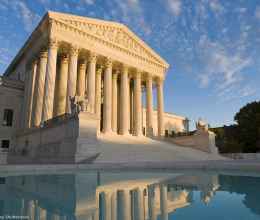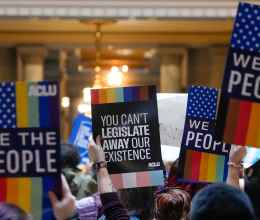
FOR IMMEDIATE RELEASE:
April 19, 2010
CONTACT:
Courtenay Strickland, Director of Public Policy, ACLU of Florida, (305) 457-5422 cell or cstrickland@aclufl.org; or Brandon Hensler, Director of Communications, ACLU of Florida, (786) 363-2722 office or bhensler@aclufl.org
TALLAHASSEE, Fla. – Numerous religious organizations, clergy and nonpartisan citizen organizations representing a wide range of interests today called upon Florida Speaker of the House Larry Cretul and Senate President Jeff Atwater to halt two joint resolutions that have been making their way through the state legislature’s chambers.
The groups said that the anti-religion, anti-education legislation would: pit religious groups against each other in a competition for government funding, create divisive controversies about favoritism towards religious groups that would receive government funding, undermine the current highly successful contractual relationship between the government and religiously affiliated charities, and make it difficult for the state to meet its mandate to provide a free high-quality public education to Florida’s children.
Among the diverse array of groups opposing the legislation are (in alphabetical order): AJC (American Jewish Committee) - Dade/Broward, Palm Beach County, and West Coast Florida Offices, American Civil Liberties Union (ACLU) of Florida, Americans United for Separation of Church and State, the Anti-Defamation League (ADL), Florida AFL-CIO, Florida Alliance for Retired Americans, Florida Alliance of Planned Parenthood Affiliates, Florida Education Association (FEA), Florida Public Interest Research Group (Florida PIRG), Florida PTA, the Interfaith Alliance, the League of Women Voters of Florida, NAACP National Voter Fund, National Congress of Black Women, National Council of Jewish Women (NCJW) - State of Florida Public Affairs Network, People for the American Way, Union for Reform Judaism, and Unitarian Universalist Legislative Ministry of Florida (UULMF). Individual clergy members have also voiced opposition to the measures.
“This proposal would pave the way to government-funded religion,” said the Reverend Harry B. Parrott, a retired Baptist minister and President of the Clay County Chapter of Americans United for Separation of Church and State. “It’s important that congregations not have to compete with each other for government funding. If one church receives more funding than another, or one religious group is excluded from funding, then the government will be favoring the religious beliefs of that congregation over those of others. That’s exactly what the principles protecting religious freedom are supposed to prevent.”
Groups’ concerns about Senate Joint Resolution (SJR) 2550 and House Joint Resolution (HJR) 1399 are wide-ranging due to the array of negative impacts that passage of the proposed constitutional amendment could have. SJR 2550/HJR 1399 would place on the November ballot a state constitutional amendment to remove Florida’s 125-year-old prohibition against the use of state funds directly or indirectly in aid of any church, sect, religious denomination or sectarian institution. A three-fifths vote of each chamber is required in order to place the amendments on the ballot.
David Barkey, Southern Area Counsel for the ADL, stated that the ADL shares other groups’ concerns about the detrimental impact of the proposed amendment on individual religious liberty. Mr. Barkey went on to add, "As a leading national expert on domestic extremism and terrorism, ADL also is deeply concerned that SJR 2550/HJR 1399 would have the unintended, but extremely serious consequence of creating a constitutional right for any religious group, including those that espouse anti-Semitic, extremist, or racist religious beliefs, to receive taxpayer dollars. Because there are all kinds of religious extremists in Florida, this danger is very real."
In addition to removing the 125-year-old “no aid” provision from the state constitution, the proposed amendment would add the following statement, “An individual may not be barred from participating in any public program because that individual has freely chosen to use his or her program benefits at a religious provider.” Rather than addressing some fictitious need for additional protections against religious discrimination, as proponents would have the public believe, the addition of this statement opens the door to expansive voucher programs not only in education, but also in the provision of sectarian social services, and more.
Brad Ashwell, Legislative Advocate for Florida Public Interest Research Group added, “A great deal more honesty is needed in the conversations about this legislation. Sadly, proponents are touting the proposal as an anti-discrimination measure, when the fact is that the Florida Constitution, as well as our state and federal civil rights laws, all already contain protections against discrimination on the basis of religion. It’s simply not good governance for our legislators to attempt to deceive the public with misleading ballot language.”
Latha Krishnaiyer, Florida PTA Legislative Chair, agreed, saying, “We should call this bill what it is. It’s not a non-discrimination proposal – it’s a voucher proposal. It’s hard to see how the state can meet its constitutional mandate under Article IX, Section 1 of the Florida Constitution to provide a free, high-quality public education to all our students if already scarce state funding is siphoned off to church-run schools.”
Proponents of SJR 2550/HJR 1399 have also used the scare tactic that religiously affiliated charities are threatened by the “no aid” provision. In truth, the proposed amendment, if passed, would be a radical departure from the contractual relationship between government and religiously affiliated charities that have served the needy for decades. Religiously affiliated charitable organizations such as Catholic adoption agencies, Lutheran Social Services, Jewish Vocational Services and many others have for many years utilized government funding to provide crucial services without having as a primary purpose or effect the advancement of religion and without discriminating in who is hired.
“At this tough time for our economy, schools and social services providers are already suffering drastic funding cuts. It would be devastating for the few funds that remain to be taken from organizations that provide for the needs of our community without proselytizing and without discriminating in who they hire in order to direct those funds to religious institutions that under these proposals would be legally permitted to do exactly that. We should not be permitting tax dollars to be used to discriminate in employment practices,” said Rich Templin of the Florida AFL-CIO.
In the April 13, 2010 Senate Judiciary hearing on SJR 2550, no member of the committee could cite any other state in the country that has amended its constitution in this way. The reality is that no one knows what additional impact such a constitutional amendment might have beyond the grim ones that are evident. On the other hand, all but 11 states in the country have some form of a “no aid” provision in their state constitutions.
“The Legislature is misleading the people of Florida – and playing with fire in divisive talk about religious discrimination – to make it appear that our 125-year-old constitutional principles need to be amended because there is fictitious rampant, statewide religious discrimination,” said Howard Simon, Executive Director of the ACLU of Florida. “The real purpose is to claim that the denial of taxpayer funds to support church-run schools or religious organizations is itself some form of religious discrimination. But of course it is not. It is a fundamental principle of religious liberty. Our current system works – allowing religiously affiliated charitable organizations that don’t proselytize to receive government contracts to serve the needs of the community, while protecting the free exercise of individuals and churches across the state.”
Deirdre Macnab, President of the League of Women Voters of Florida, added, “The League encourages the Legislature to look for additional funds for our schools, not ways to siphon off needed funds from public schools to private entities with no accountability for achievement or public dollars. Instead we call on the legislature to provide the financial support needed for a free public school system with a high quality of education for all.”
About the ACLU of Florida
The ACLU of Florida is freedom's watchdog, working daily in the courts, legislatures and communities to defend individual rights and personal freedoms guaranteed by the Constitution and the Bill of Rights. For additional information, visit our web site at: www.aclufl.org.
# # #





